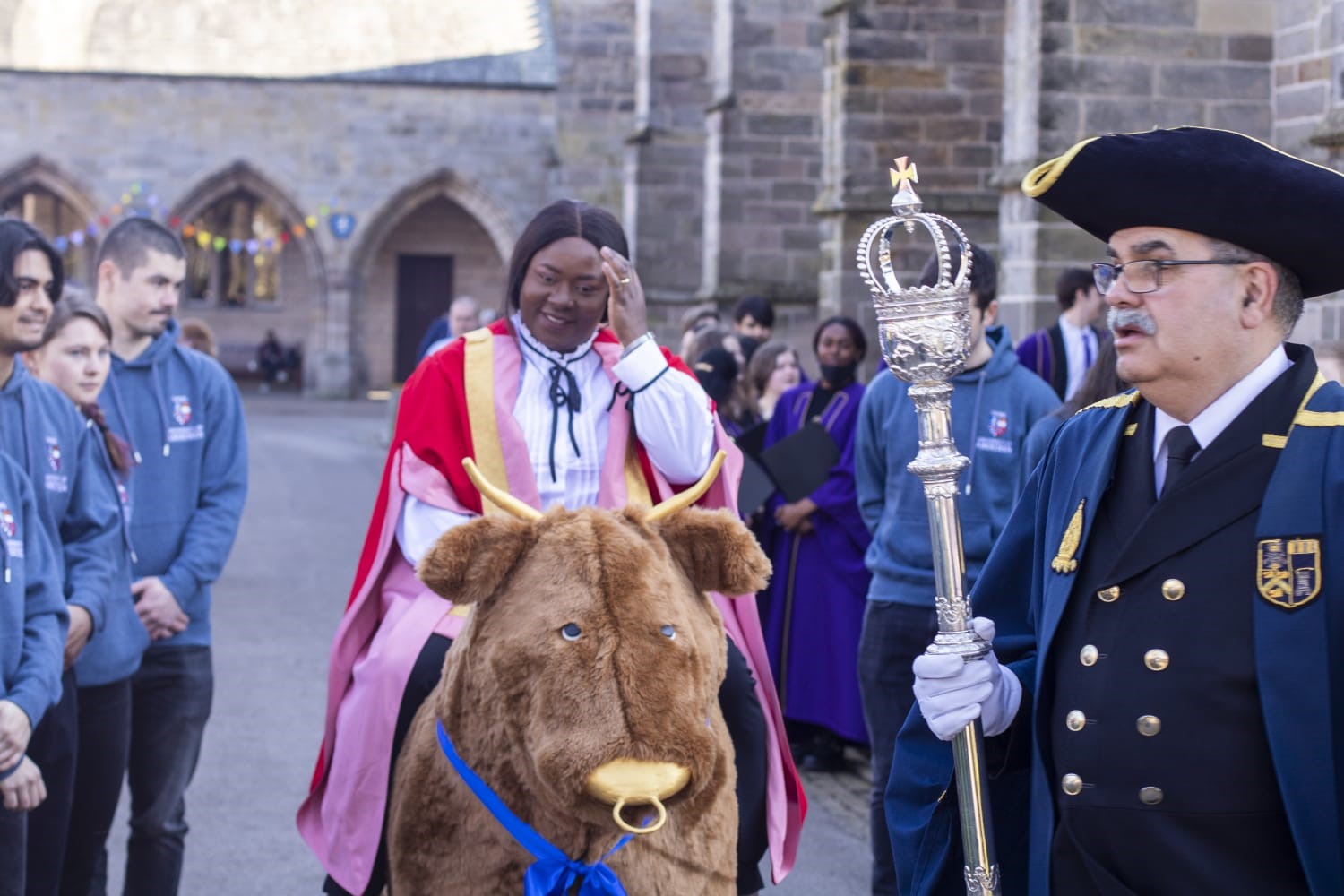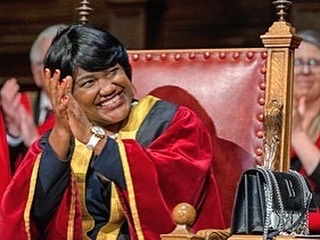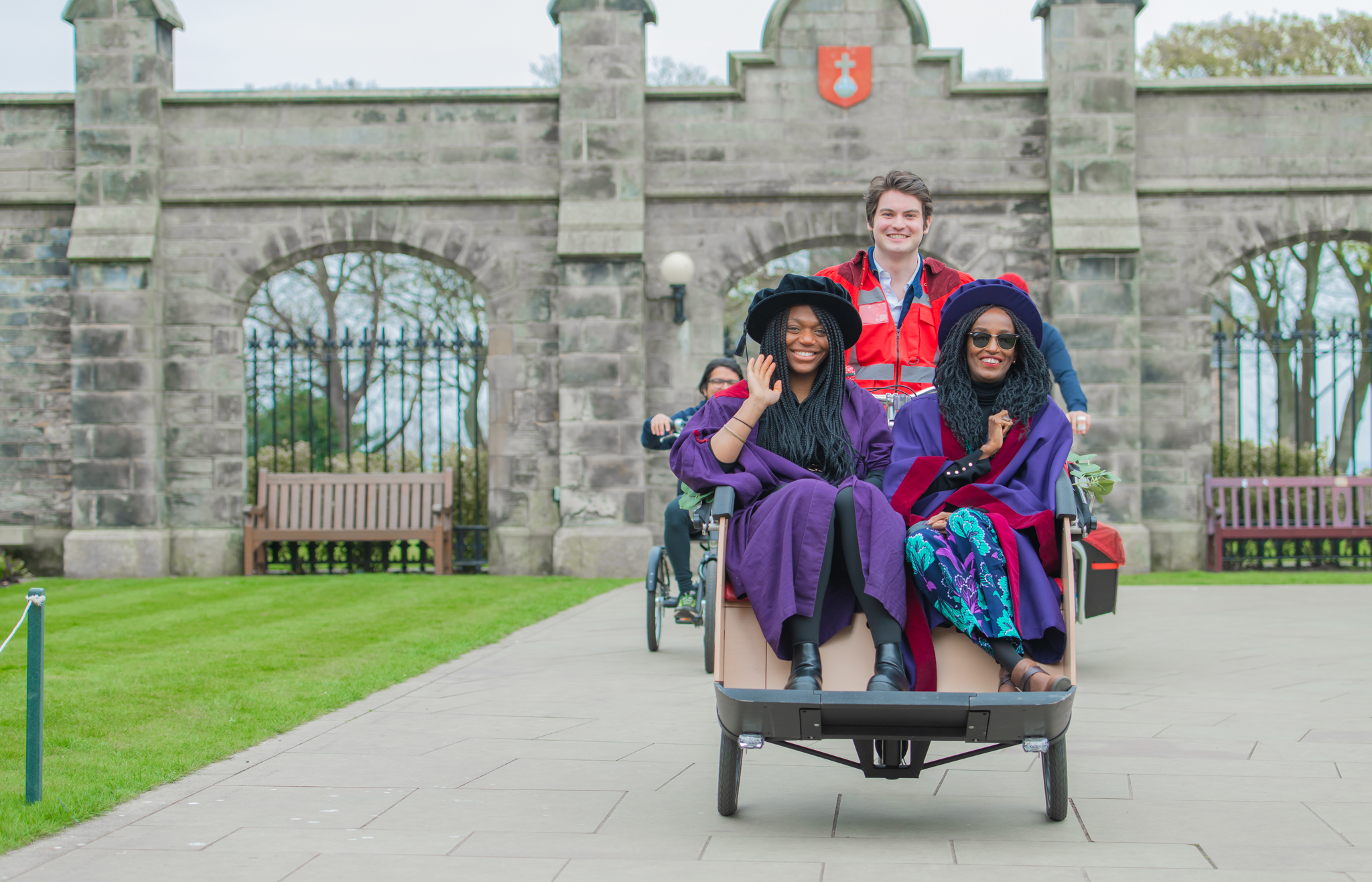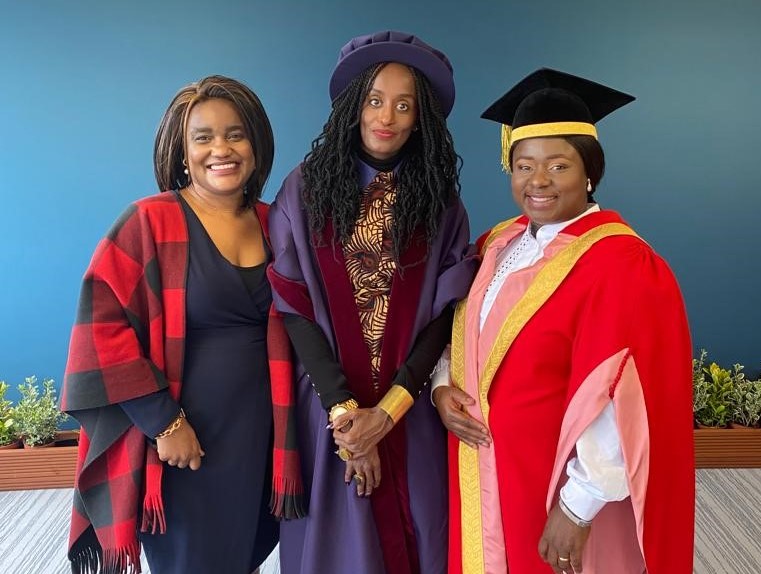Making history: The black female rectors leading Scotland's ancient institutions into the future
When she was installed as rector of the University of Aberdeen in March this year, Martina Chukwuma-Ezike was paraded through the streets on a large stuffed cow before addressing a crowd of students on a lawn outside the university’s Elphinstone Hall. It is a tradition whose origins have been lost in the mists of time, but the parade is designed to be a jovial affair, with the inclusion of Angus – a soft toy-cum-rocking horse mounted on carrying poles – thought to be the remnant of a student charity campaign. Chukwuma-Ezike delighted in the affair, which was attended by 31 family members who had made the journey from Nigeria for the occasion.
It will be a different matter when human rights lawyer Debora Kayembe is finally installed as rector of the University of Edinburgh. Though she succeeded campaigner and trade unionist Ann Henderson in February last year, Covid restrictions mean Kayembe is yet to have an official installation ceremony. When she does, she will not follow tradition by being paraded around the institution’s Old College quadrangle in a ceremonial chair, pointing out that the traditional Edinburgh seat is an actual sedan chair that brings to mind far too many images of subjugation and enslavement for her to go near it.
“The chair is colonial and I do not want to sit in that chair,” Kayembe says. “I want the ceremony to take place – it’s really symbolic – but I want it to take place humbly. Churchill [who was the university’s rector between 1929 and 1932] was in a convertible car, but I can walk – I don’t see why I have to go in that horrible, horrible thing.”
 Martina Chukwuma-Ezike at her installation ceremony
Martina Chukwuma-Ezike at her installation ceremony
It is not the sort of comment you would normally expect to hear from a university rector, but then Kayembe is not the kind of person Scotland is used to seeing as a university rector. Like Chukwuma-Ezike she hails from Africa, having been born and brought up in the Democratic Republic of Congo (DRC). Along with Chukwuma-Ezike and Leyla Hussein at the University of St Andrews, she has made history by becoming one of the first three women of colour to actively hold the senior educational roles in Scotland (South African politician Winnie Madikizela-Mandela was elected by the students of Glasgow University in 1987, but did not play an active role on campus).
It is only relatively recently that Scottish universities started electing women of any ethnic background as rectors. St Andrews led the way by appointing journalist Kathrine Whitehorn in 1982, but waited until 2014 to elect another in the form of Labour politician Catherine Stihler. Somali-born psychologist and social activist Hussein, who is well known for her campaigning work on female genital mutilation, was appointed in 2020. Prior to Chukwuma-Ezike, Aberdeen had celebrity cook Clarissa Dickson Wright between 1998 and 2004 and Green politician Maggie Chapman from 2014 to 2021, and Edinburgh had Henderson immediately before Kayembe as well as broadcaster Muriel Gray between 1988 and 1991. But six women across three institutions in the 160-plus years since the Universities (Scotland) Act required the ancients to elect rectors is hardly a large number. The significance of these appointments raising that number by 50 per cent in one fell swoop cannot be overstated.
Chukwuma-Ezike first set foot on Scottish soil in 2008, having left her home in Nigeria’s Rivers state to study for an MBA at Aberdeen University. She chose the city over others in the US and Canada, she says, because when she called Aberdeen “the lady I spoke to was very warm and I could sense her smile from the phone”. “I thought, if she’s this lovely then the people in Aberdeen must be this lovely,” she adds. Her experience largely bore this out, with lecturers at the university going above and beyond what was required of them to help her establish advice charity the Asthma and Allergy Foundation, which she is chief executive of, in 2009. When she was asked to stand as rector she saw it as an opportunity to give something back.
“When I started the charity I didn’t have money in the bank – my foot soldiers have always been students,” she says. “The bulk of my staff are student volunteers. They are medical and marketing students mostly – they are helping us and we are helping them.
“I’ve always had a link with the university. I graduated but actually I didn’t leave because I’ve always interacted with students. I genuinely care about young people and developing them for the world of work and I do a lot of mentoring and career advice. They came to me and said I’d be a good rector, that’s how I ended up contesting.”
Much of her platform was around looking after student mental health, something she felt well versed to campaign on after an extended period of pandemic shielding due to her own severe asthma. Students also indicated that equality, diversity and inclusion (EDI) was an area they wanted the university to do better on – “Who better to champion their cause than me, a minority,” Chukwuma-Ezike says. Though she adds that she personally has never experienced racism during her time in Aberdeen, Chukwuma-Ezike sees addressing overt racism and helping break down the barriers that structural racism maintains as a fundamental part of her role.
“As rector one of the key things I do is ensure every student and staff member has every right to be treated with respect and get support,” she says. “We take racism at the university very seriously and we have very strict policies. I have had extensive conversations about racism and what it means. Of course people have experienced racism, but it’s my responsibility to make sure it’s looked into. We’re very proactive when it comes to things like that, but Aberdeen is not known for racism.”
 Debora Kayembe performing rectorial duties at the University of Edinburgh. Picture: Neil Hanna.
Debora Kayembe performing rectorial duties at the University of Edinburgh. Picture: Neil Hanna.
Though Kayembe’s focus at Edinburgh is broadly similar to Chukwuma-Ezike’s at Aberdeen, her journey to Scotland could not have been more different. As a young lawyer in the DRC, Kayembe’s work had focused on human rights abuses and, after she wrote a report into a number of massacres carried out during the Second Congolese War, a threat was made on her life. She fled her home country to seek asylum nearly 20 years ago and has not returned since.
“I landed at Heathrow Airport in February 2005,” she recalls. “It was dark and so cold, I had no coat and I was seven months pregnant.”
Despite speaking no English at the time, Kayembe was able to put in an asylum application and was moved to Lancashire, where a chance encounter with her local MP Jack Straw, who also happened to be foreign secretary at the time, meant he was able to advise when her refugee status was initially denied. Once it was granted she began to think about work but, despite her legal qualifications, was told she would have to start her legal education all over again to be recognised in England and Wales. The rules in Scotland were different, however, and, having divorced her husband, she packed herself, her two children and her accumulated belongings into a van and made the journey north.
“I remember the day I crossed to Scotland,” she says. “There was a sign that said ‘Welcome to Scotland, the land of the free’ and I said ‘I’m one of them’.”
Things have not been plain sailing for Kayembe and her family since she arrived. After Boris Johnson became prime minister and the UK left the EU, her Bonnyrigg home was targeted by a mob demanding that she and her children ‘go home’; her daughter was asked to play the role of an enslaved person when her class was studying a slavery-themed song by Nina Simone; she had to change the tyres on her car four times in one year after they were repeatedly slashed; and she eventually had to move to a property next to a police station to escape the racist attacks.
Yet she is still proud to call Scotland – and Bonnyrigg – her home. It is where she has launched a successful translation business that has helped a million refugees around the world navigate complex immigration processes; where she turned her experience of racist abuse into a positive by launching a civil rights movement – the Freedom Walk campaign – to promote social reforms, racial justice and community harmony; where she made history as the first African to have their portrait hung in the Royal Society of Edinburgh; and where she is now using her influence to make it easier for others to follow in her path through her role at the University of Edinburgh.
Stella Maris vividly remembers the moment when, after moving to St Andrews to study English and philosophy, she realised just how different she was from the students around her. Born in Nigeria, she had moved to Leicester as a young child and was used to seeing other black people around her. But on moving to Scotland she went instantly from being one member of a sizeable minority group to a minority of one.
“When I started and moved into halls I realised when we met for our welcome talk that I was the only black person in the room,” she recalls. “It was an instant moment of self-awareness, but not in a positive way – my skin crawled.”
 Stella Maris (left) and Leyla Hussein at Hussein's installation ceremony. Picture: Gayle McIntyre.
Stella Maris (left) and Leyla Hussein at Hussein's installation ceremony. Picture: Gayle McIntyre.
Maris, who was instrumental in Hussein’s campaign for the rectorship, now leads the rector’s committee as rector’s assessor at St Andrews, sitting on the university court and helping drive change at the institution. She says that while it was initially difficult to get the impact of her experience across, and how damaging it was to the university and its student body, some positive changes have been brought in since Hussein was elected in 2020.
“The nature of student activism is that there’s a balance between frustration and inaction, with lots of anger,” she says. “Initially the university didn’t understand where that frustration was coming from because they [members of the university court] couldn’t put themselves in the shoes of students. A lot of what we were asking for wasn’t sticking.
“There were times when Leyla and I wanted to step down. The university court had never been stress tested before and though it said it wanted more diversity, when they were stress tested by two black women it didn’t go incredibly well. I always understood from my interactions with court members that they had the best of intentions. I never doubted that – they might not do things I agree with, but ultimately they weren’t doing it out of malice. I’ll forgive ignorance in the first instance but after that I expect people to do better and we were dealing with ignorance, not in the pejorative sense but in the very real sense – they couldn’t fix a problem they weren’t aware of, but they learned and were accommodating.”
Though Maris says she and Hussein have not achieved any kind of revolution at St Andrews, she adds that their presence on the university court has helped open the governing body’s eyes to issues they were not aware of but which deter prospective students from certain backgrounds applying for places. Maris says that while she has “always felt much more welcome in Scotland than in England”, she almost didn’t take up her own place at the university because there was nowhere in St Andrews for her to get her hair braided. Travelling back to a Leicester hairdresser once a month was a huge expense, but there are other issues such as accessing kosher or halal foods that are only taken into account by the minority of people affected – a minority that previously had no voice. Raising awareness of how important it is to “help people to access their cultures” is, she says, at the heart of inclusion but was going unnoticed by university management prior to 2020.
“We are seeing work being done by the institution,” she says. “Recently the principal released a video for the LGBTQI+ community that was incredible. Acknowledging harms done and where they have failed people reflects the wider transition for this ancient institution to a place of acceptance.”
EDI has moved further up university agendas in recent years, with a never-ending stream of reports about the lack of non-white faces in professional roles shining a spotlight on the lack of opportunity that exists further down the pipeline. Yet while every institution has policies backed up by good intentions, unless prospective students can see the potential for change there is little chance of any tangible change actually being made and the lack of diversity continues to self-perpetuate. For Kayembe, her appointment alone has helped improve the University of Edinburgh’s EDI scores, which in turn is becoming self-fulfilling by encouraging applications from a much wider pool of students.
“It makes a big difference to students when they are choosing where to go,” she says. “This year we had a lot of poorer students – now people look at the University of Edinburgh as a place for ordinary people. I want to give the chance to all parts of society to access this excellent education.”
 (Left to right) Debora Kayembe, Leyla Hussein and Martina Chukwuma-Ezike
(Left to right) Debora Kayembe, Leyla Hussein and Martina Chukwuma-Ezike
Maris, too, says things have changed hugely during her five years at St Andrews, with the experience of students entering the university now varying drastically to the one she had when she first came to Scotland.
“The end result of having a black female rector is to provide representation at the top,” Maris says. “I don’t know for sure if that’s had an effect on admissions but I can see that the number of black students at this university has skyrocketed. I recently went to another welcome talk – I’m still in the same hall – and I realised how much more diverse that room was. Even thinking about it now I’m getting goosebumps. I’m not saying they have fixed the problem and I don’t know if any of that has anything to do with seeing a black woman as chair of the university court, but it’s a sign that what the university is doing is working. Now it’s about maintaining that momentum.”
Few, if any, people working in Scotland’s educational establishments would consider themselves racist, and the vast majority of them would be right. Structural racism – the kind of prejudice that is built into the walls of ancient institutions through history and tradition, through apathy and default – is a very different thing, though, and it does not follow that a university isn’t racist simply because its people aren’t. Yet often it is only when traditions that have for centuries been taken for granted start to be questioned – such as the use of Edinburgh University’s ceremonial chair – that structural racism is recognised and can begin to be unwound. Often – too often – that only happens when those affected by racism are there to call it out, which is why, at a time when Scotland is just beginning to reckon properly with its colonial past, the appointment of three black women to roles traditionally reserved for the wealthy, white males these institutions were created by and for is so significant.
And while Maris has noted the positive impact the presence of a black female rector has had on St Andrews’ student demographic, Chukwuma-Ezike and Kayembe believe their legacy can be about far more than just race.
“When I won my election, the results were announced and I was like ‘wow, I’ve won’,” Chukwuma-Ezike says. “My husband said ‘you haven’t just won an election, you are the first black person to be rector, that should stand for something’. My message during my installation ceremony was that it wasn’t just a win for me as a young British African woman – what it means is that every young girl out there shouldn’t be limited by their background or colour or socio-economic status. For the black and Asian community it shows that Scotland is open and everyone is given equal opportunities – if they weren’t I wouldn’t be here, I wouldn’t be a CEO. I have succeeded because I have been supported hugely. There’s so much to celebrate and look forward to for the future. The sky is not the limit, it’s the start.”
Kayembe adds: “I am the woman who has paved the way, not only for black people but for anyone who aspires to achieve greatness in their life. This university is grounded in colonial ties and racism is still here in this place – what I have achieved is greatness. Can you compare the woman who arrived in London freezing to the woman who is sitting here now? It’s a story that tells the world that you can believe in anything so long as you believe in yourself. The woman who raised me said ‘I was raising you not knowing what you would become one day’ – these are the things that give hope in the world and I want to inspire many parents to see what their children can achieve. It is right to look at my race because of [racial] injustice, but I want it to be testimony to what any person is capable of achieving.”
Holyrood Newsletters
Holyrood provides comprehensive coverage of Scottish politics, offering award-winning reporting and analysis: Subscribe